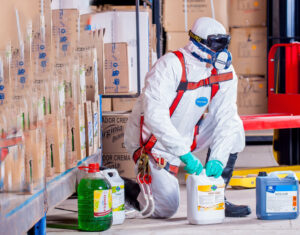The hotel industry has undergone a significant transformation over the years, with a growing emphasis on providing guests with a memorable and safe experience. While many factors contribute to the success of a hotel, one often overlooked aspect is the role of laboratory packs. These specialized tools and equipment play a crucial role in ensuring the safety, quality, and overall excellence of a hotel’s services. In this article, we will explore why hotels would need a laboratory pack and how it can benefit their operations.
The Role of Laboratories in Hotels
Before delving into the importance of laboratory packs, it’s essential to understand the broader role that laboratories play in the hospitality industry. Hotels, regardless of their size or location, rely on a wide range of services to cater to their guests’ needs. This includes food and beverage services, swimming pools, spas, fitness centers, and more. All of these amenities involve complex operations that require rigorous quality control and safety measures.
Laboratories in hotels serve several critical functions, such as:
Quality Control: Hotels often have in-house kitchens and restaurants, where food and beverages are prepared and served. Laboratory analysis ensures that the ingredients used are safe, fresh, and of the highest quality. This helps maintain the standard of culinary excellence that guests expect.
Water Safety: Swimming pools, hot tubs, and water features are common attractions in hotels. Regular testing of water quality is essential to prevent health risks associated with waterborne pathogens and to ensure guest safety.
Environmental Monitoring: Many hotels are committed to sustainability and eco-friendliness. Laboratories help monitor and maintain the hotel’s environmental initiatives, such as waste management, energy efficiency, and water conservation.
Guest Safety: Ensuring guest safety is paramount for any hotel. Laboratories are instrumental in conducting safety checks for various areas, such as kitchen equipment, fire detection systems, and even indoor air quality.
Now that we’ve established the importance of laboratories in hotels, let’s explore why having a laboratory pack is crucial.
The Need for a Laboratory Pack
A laboratory pack is essentially a comprehensive kit that contains all the necessary tools, equipment, and consumables needed to run essential tests and analyses within a hotel environment. These packs are customized to suit the specific needs of each hotel, ensuring that they have everything required for their unique operations. Here’s why hotels need a laboratory pack:
Efficiency and Convenience:
A laboratory pack provides convenience and efficiency by consolidating all the essential items in one place. Hotel staff can easily access the necessary tools without having to search for or order individual items, saving valuable time and effort.
Cost-Effective:
Purchasing a laboratory pack is often more cost-effective than acquiring each item separately. Hotels can benefit from bulk pricing, discounts, and reduced shipping costs when they opt for a comprehensive pack.
Compliance and Quality Assurance:
Hotels are subject to various regulations and standards, particularly in areas like food safety and water quality. A laboratory pack ensures that the hotel can conduct necessary tests and maintain compliance with ease, reducing the risk of non-compliance penalties.
Customization:
Laboratory packs can be tailored to the specific needs of the hotel. Whether it’s a luxury resort, a business hotel, or a boutique inn, the pack can include the relevant equipment and supplies to meet the hotel’s unique requirements.
Guest Satisfaction:
A well-maintained and safe hotel environment contributes to guest satisfaction. Knowing that the hotel takes safety and quality seriously can enhance the overall guest experience and lead to positive reviews and repeat business.
Emergency Preparedness:
In the event of unexpected emergencies or health concerns, having a laboratory pack on hand can be a lifesaver. Hotels can quickly respond to any issues and take immediate corrective actions.
Components of a Typical Laboratory Pack
A laboratory pack for a hotel typically includes a range of items that cover the most common testing and analysis needs. Here are some components commonly found in such packs:
- Testing Equipment:
- pH meters for water quality testing.
- Temperature and humidity monitors.
- Food safety testing equipment (thermometers, hygrometers, etc.).
- Air quality testing tools (air purifiers, particulate matter monitors, etc.).
- Consumables:
- Test kits for water quality, including chlorine and pH testing.
- Laboratory-grade chemicals for various tests.
- Sterile sampling containers.
- Microbiological test kits for food and water safety.
- Safety Gear:
- Personal protective equipment (PPE) such as gloves and lab coats.
- Eye protection gear.
- First aid supplies.
- Documentation:
- Record-keeping materials for maintaining test logs.
- Reference materials for quality control.
- Training Resources:
- Manuals and guides on how to perform various tests.
- Online training resources for hotel staff.
Conclusion
In the modern hospitality industry, maintaining high standards of safety, quality, and sustainability is non-negotiable. A laboratory pack can be an invaluable asset for hotels, ensuring that they have the tools and equipment needed to meet and exceed guest expectations.
By investing in a laboratory pack tailored to their specific needs, hotels can enhance efficiency, save costs, stay compliant with regulations, and most importantly, prioritize guest safety and satisfaction. In today’s competitive landscape, a commitment to excellence in every aspect, including laboratory testing, can set a hotel apart and lead to long-term success. As hotels continue to evolve and adapt to changing guest preferences and industry trends, having a well-equipped laboratory becomes an essential part of their toolkit for success.
